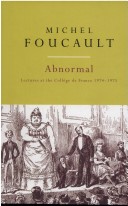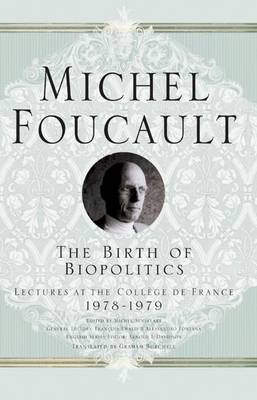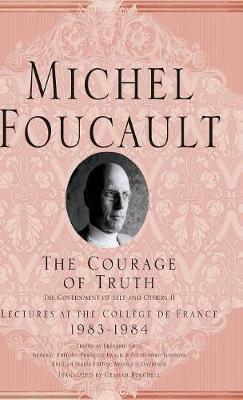Lectures at the College de France
5 primary works
Book 2
Michel Foucault remains one of the towering intellectual figures of the last half century. Michel Foucault's works on sexuality, madness, the prison and medicine are classics and his example continues to challenge and inspire. The philosopher gave public lectures at the College de France from 1971 until his death in 1984 - these lectures were seminal events and created benchmarks for contemporary critical inquiry. The lectures comprising "Abnormal" begin by examining the role of psychiatry in modern criminal justice and its method of categorizing individuals who "resemble their crime before they commit it." Michel Foucault shows how and why defining "abnormality" and "normality" were prerogatives of power in the 19th century and shaped the institutions. The College de France lectures add to our appreciation of the philosopher's thought and offer a unique window into his way of thinking.
Book 5
Michel Foucault's lectures at the College de France in 1979, The Birth of Biopolitics, pursue and develop further the themes of his lectures from the previous year, Security, Territory, Population. Having shown how Eighteenth century political economy marks the birth of a new governmental rationality -- seeking maximum effectiveness by governing less and in accordance with the naturalness of the phenomena to be governed -- Michel Foucault undertakes the detailed analysis of the forms of this liberal governmentality. This involves describing the political rationality within which the specific problems of life and population were posed: "Studying liberalism as the general framework of biopolitics". What are the specific features of the liberal art of government as they were outlined in the Eighteenth century? What crisis of governmentality characterises the present world and what revisions of liberal government has it given rise to? This is the diagnostic task addressed by Foucault's study of the two major twentieth century schools of neo-liberalism: German ordo-liberalism and the neo-liberalism of the Chicago School.
In the years he taught at the College de France, this was Michel Foucault's sole foray into the field of contemporary history. This course thus raises questions of political philosophy and social policy that are at the heart of current debates about the role and status of neo-liberalism in twentieth century politics. A remarkable feature of these lectures is their discussion of contemporary economic theory and practice, culminating in an analysis of the model of homo oeconomicus. Foucault's analysis also highlights the paradoxical role played by "society" in relation to government. "Society" is both that in the name of which government strives to limit itself, but it is also the target for permanent governmental intervention to produce, multiply, and guarantee the freedoms required by economic liberalism. Far from being opposed to the State, civil society is thus shown to be the correlate of a liberal technology of government.
In the years he taught at the College de France, this was Michel Foucault's sole foray into the field of contemporary history. This course thus raises questions of political philosophy and social policy that are at the heart of current debates about the role and status of neo-liberalism in twentieth century politics. A remarkable feature of these lectures is their discussion of contemporary economic theory and practice, culminating in an analysis of the model of homo oeconomicus. Foucault's analysis also highlights the paradoxical role played by "society" in relation to government. "Society" is both that in the name of which government strives to limit itself, but it is also the target for permanent governmental intervention to produce, multiply, and guarantee the freedoms required by economic liberalism. Far from being opposed to the State, civil society is thus shown to be the correlate of a liberal technology of government.
Book 6
Book 7
Book 8
The Courage of the Truth is the last course that Michel Foucault delivered at the Collège de France. Here, he continues the theme of the previous year's lectures in exploring the notion of "truth-telling" in politics to establish a number of ethically irreducible conditions based on courage and conviction. His death, on June 25th, 1984, tempts us to detect the philosophical testament in these lectures, especially in view of the prominence they give to the themes of life and death.



